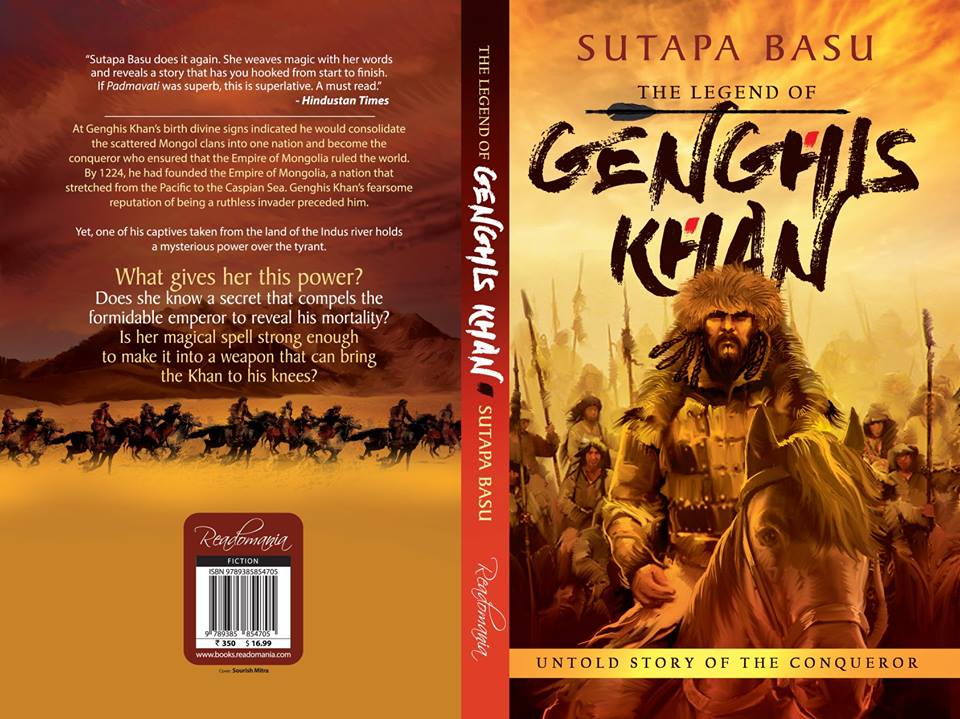The writer of the book, Genghis Khan, Sutapa, tells us about her book. Her scholarship and research makes it a must read for one and all. Here’s her critique of her work, in Different Truths.
The world knows Genghis Khan as a tyrannical despot, annihilator of entire nations, barbaric slaughterer of millions. To a large extent, that is how the historians of yore, especially from the so-called civilised western and middle-eastern regions, profiled him. It was probably anathema to them and their rulers to admit that they had been completely outwitted and thoroughly trounced by a nomad from the boondocks.
Modern study taken up by several Mongolists, such Dr. John Man, and translation and analysis of The Secret History of the Mongols, written during Genghis Khan’s period begs to differ from this erstwhile opinion of the world conqueror. In fact, Dr Man even holds forth in his book, Genghis Khan, Life, Death, Resurrection that he had qualities of a great leader that may apply more widely even beyond his times.
There is no doubt that Genghis Khan was a character rooted in his time and period, yet he was unique, like his empire. I will try to present a pithy analysis here.
Belief in Heaven’s Blessings
While it is common for many rulers to claim divine support, it is usually limited to the country and the  people. Genghis Khan, probably believed himself, and certainly his heirs did, that Heaven had really given the world to them, and it was their job to make everyone acknowledge this astonishing fact. With hindsight, nothing could be crazier but during those times, let alone a Mongol, nobody had any idea what the world was like. It was this belief that gave Genghis Khan the supreme confidence to be righteous about his world dominance. In fact, Ala-ad-Din’ Ata-Malik Juvaini, during 1252-53, writes in Genghis Khan, The History of the World Conqueror, (translated by JA Boyle) of Genghis Khan telling the terrorised citizens of Bukhara, reasons for his victory over them, ‘O people, know that you have committed great sins…I say it is because I am the punishment of God. If you had not committed great sins, God would have not sent a punishment like me upon you.’
people. Genghis Khan, probably believed himself, and certainly his heirs did, that Heaven had really given the world to them, and it was their job to make everyone acknowledge this astonishing fact. With hindsight, nothing could be crazier but during those times, let alone a Mongol, nobody had any idea what the world was like. It was this belief that gave Genghis Khan the supreme confidence to be righteous about his world dominance. In fact, Ala-ad-Din’ Ata-Malik Juvaini, during 1252-53, writes in Genghis Khan, The History of the World Conqueror, (translated by JA Boyle) of Genghis Khan telling the terrorised citizens of Bukhara, reasons for his victory over them, ‘O people, know that you have committed great sins…I say it is because I am the punishment of God. If you had not committed great sins, God would have not sent a punishment like me upon you.’
Focused Ruthlessness
Never in the history of the world, have there been the kind of genocides and massacres unleashed by Genghis Khan and his heirs. He achieved what others could only dream of; complete annihilation of all those who opposed him. But unlike modern genocides, his was not ideological. It was true that the Mongols considered themselves the top nation among lesser breeds, but there were three factors that restricted their wave of destruction. First, Genghis appreciated talent, whatever its ethnicity and used it wherever and whenever he found it. Second, his prime purpose was not total destruction but eternal rule which is difficult to achieve with devastated lands and alienated populace. Third, this meant that his aim to crush his foes was purely strategic—to force capitulation. He was clear in his message; opposition meant death, but surrender meant life as part of Genghis Khan’s divinely-supported empire.
Genghis Khan’s traits given above may not work in today’s world but there are his other skills which would certainly be envied by modern leaders.
What are Those Skills?
Genghis Khan controlled his own image. He was his own spin doctor because he vetted the stories in The Secret History of the Mongols to his benefit. He had the rare ability to accept criticism. He always kept his word. He encouraged and repaid loyalty in equal measure. He shared his army’s hardships, insisting on austere nomadic surroundings. He saw the dangers of alcoholism and would have preferred total abstinence. He rejected luxury. He recognized his own limitations, such as being illiterate he insisted his sons and adopted brother become literate. Comprehending that his government needed written laws, he introduced a script. He was a realist and when necessary a risk-taker. He was not interested in violence for its own sake; there is no record of torture under Genghis Khan’s rule.
Genghis Khan had a remarkable lack of ego equating his interests with that of his state. Surprisingly for a world conqueror, he was not arrogant and displayed extreme humility in the face of an immense task which he felt had been imposed on him. He was a master of surprises and a meticulous planner. He was magnanimous even to his enemies. He was a deep thinker and brought about radical changes to the society of his empire. He was a spiritual seeker and imposed tolerance for all religions within his empire.
Now, according to Daniel Goleman, the successful leadership theorist, many of the above traits fall into the ‘competencies’ that are displayed by top leaders of the modern world. If he lived today, Genghis Khan would be termed as a highly effective leader.
Before I conclude, I must mention his capability as a military strategist. Genghis Khan began his conquest as a leader of a nomadic army; mounted on fast horses, adept with their bows, arrows and swords. Their basic purpose was to attack, subjugate, plunder and convert rulers into vassals. Nevertheless, very soon they came up against cities that were well-defended and fortified. To vanquish the garrisons inside these forts, the weapons of a nomadic army was not enough. Speedily, Genghis Khan used the captives and enemy deserters help in manufacturing siege weapons and give lessons in their use to his men. By the time, he had conquered most of the Jin Kingdom, Genghis’ military tactics had changed. His army enhanced by trebuchets with their fire and smoke bombs, battering rams on wheels, scaling ladders, four-wheeled mobile shields, flame-throwing tubes, and the double and triple-bowed siege bows that could fire arrows to punch holes in baked-earth walls from a kilometre away had become a terrifying juggernaut rolling across lands. Another remarkable ploy Genghis Khan used was pushing crowds of captives ahead of his soldiers. Usually, when the besieged people saw their own relatives in the forefront of the attacking army, they surrendered rather than kill their compatriots.
I can only conclude by reiterating that as a leader, Genghis Khan was the greatest ever. However one may assess him, he will always stand out as leader of genius.
©Sutapa Basu
Photos sourced by the author
#Book #HistoricalFiction #GenghisKhan #DifferentTruths





 By
By
 By
By
 By
By
 By
By
Sutapu- Very impressed by the subject of your book, and the cover too !!! Big undertaking and research. God bless!!